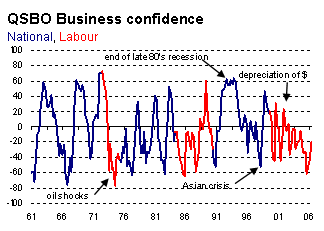Business blues
Business confidence indicators have picked up over recent months, and are now well ahead of the lows reached at the end of 2005. But despite these gains they remain in negative territory. In fact both the NZIER’s and the National Bank’s business confidence measures have been in the red since 2002 — a period which the economy has grown at above average growth rates for the majority of the time. So what gives? Business confidence measures are supposed to provide insight into future economic prospects, but for some reason businesses have expressed a pessimistic outlook throughout one of the best periods of economic growth in New Zealand’s history. Are these guys never satisfied?
Interestingly survey responses about business expectations for their own business provide a far better steer on future economic prospects. So business leaders do know what is happening, but something is distorting their perspective about the economy as a whole. One hypothesis is that politics colours business perspectives.
To test this we examined data from the NZIER’s Quarterly Survey of Business Opinion going right back to the June quarter of 1961. Controlling for variations in economic activity (the survey’s building and manufacturing capacity utilisation reading was used as a proxy for demand) as well as one-off shocks, our analysis shows that business confidence was on average 20 points higher when a National led government held office1. That is, irrespective of actual economic conditions2,the NZIER measure of business confidence is on average 20 points lower under a Labour led government than with National.

The analysis also highlighted four events that had long lasting impacts on business confidence in New Zealand (irrespective of which political party was in power):
- the 1974 oil shocks caused a sustained fall in business confidence of 47 points (Labour government);
- emerging from the recession of the late 1980’s lifted confidence by 45 points in 1992 (National government);
- the Asian crisis of 1998 caused confidence to plummet 45 points (National government);
- the combined effects of the sharp depreciation of the New Zealand dollar and the beginnings of the current housing boom lifted confidence by 48 points in 2002 (Labour government).
Interestingly, business confidence also appears to lift, albeit minimally, six months out from an election. This is somewhat counter to the effect one would normally expect i.e. that the uncertainty created by an election would suppress business sentiment, but may reflect one or a combination of the following factors:
- a change in government is expected and this is viewed positively;
- no change in government is expected and this is view positively;
- as the election date draws closer the result becomes more certain.
It would appear then that business confidence indictors are influenced by the political leanings of business leaders. The presence of a National led government at the time the survey is taken has a positive impact on business confidence. Conversely the economic prospects during a labour led government need to be considerably higher to induce a confident outlook from the business community.


